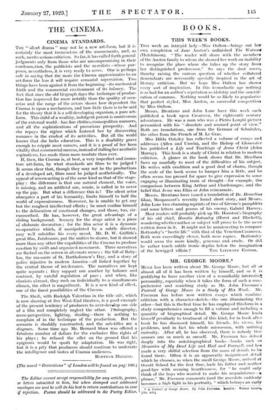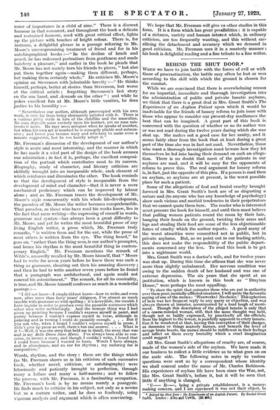MR. GEORGE MOORE.*
Mum has been written about Mr. George Moore, but all or almost all of it has been written by himself, and so it is gratifying to have another view of a remarkably interesting' personality, especially when it takes the form of such a com- prehensive and searching study as Mr. John Freeman's Portrait of George Moore in a Study of His Work. Mr. Freeman has before now written essays which combine criticism with a character-sketch—the one illuminating the other—but this is the first time lie has employed this form in a study comprehensive enough to fill a volume and including a quantity of biographical detail. Mr. George Moore lends himself peculiarly to treatment of this kind, for in book after book he has discussed himself, his friends, his views, his problems, and in fact his whole microcosm, with untiring curiosity. After all, lie has observed, there is nobody that amuses one so much as oneself. Mr. Freeman has delved deeply into the autobiographical books--books such as Memories of My Dead Life and Hail and Farewell, and has made a very skilful selection from the mass of details to be found there. Often it is an apparently insignificant detail which lie chooses, as when the small George Moore, arrived at Oscott School for the first time, bade his father and mother good-bye with seeming heartlessness, for " he could only think of the boys who wanted to make his acquaintance—a phrase," Mr. Freeman comments (and the anecdote suddenly becomes a high light in his portrait), " which betrays an early • A Portrait of George Moore. By John Freeman. landau Werner Laurie. ger. net.1
sense of importance in a child of nine." There is a discreet humour in that comment, and throughout the book a delicate and restrained humour, used with great critical effect, lights up the picture with touches of bright colour. There is, for instance, a delightful phrase in a passage referring to Mr. Moore's uncompromising treatment of friend and foe in his autobiographical books :—" In the decline of brush and pencil, he has redeemed portraiture from gentleness and made butchery a pleasure," and earlier in the book he pleads that
Mr. Moore has not merely torn his Mends to pieces, " but also put. them together again—making them different, perhaps,
but making them certainly whole." He criticizes Mr. Moore's opinion on Stevenson with ;admirable brevity :—" He thinks himself, perhaps, better at stories • than Stevenson, but worse
at the critical article ; forgetting Stevenson's last story on the one hand, and Avowals on the other " : and while he
pokes excellent fun at Mr. Moore's little vanities, he does justice to his humility :—
" Nevertheless our author, although preoccupied with his own work, is very far from being obstinately satisfied with it. There is a curious petty strife in him of the childlike and the masculine. No man depends more entirely upon his instinct, yet no man mis- trusts it more. He may seem arrogant when he speaks of another, but when his own art is touched he is strangely pliable and submis- sive ; and hence you become wary and reluctant to make even a minute suggestion, lest he too hastily adopt it."
Mr. Freeman's discussion of the development of our author's
style is acute and most interesting, and the manner in which he has made it a vital part of the design of the book arouses our admiration ; in fact it is, perhaps, the excellent composi- tion of the portrait which contributes most to its success. Biography, study of character, and literary criticism are skilfully wrought into an inseparable whole, each element of
which reinforces and illuminates the other. The book reminds us that the development of style is inseparable from the development of mind and character—that it is never a mere mechanical proficiency which can be improved by labour alone ; and as Mr. Freeman traces the development of Mr. Moore's style concurrently with his whole life-development, the paradox of Mr. Moore the writer becomes comprehensible. That paradox, as those who have read his works know, lies in the fact that mere writing—the expressing of oneself in words, grammar and syntax—has always been a great difficulty to Mr. Moore, and yet lie writes the most beautiful prose of any
living English writer, a prose which, Mr. Freeman truly remarks, is written from and for the ear, while the prose of most others is written from the eye. The thing heard," he
goes on, "rather than the thing seen, is our author's prompter, and hence his rhythm is the most beautiful thing in contem- porary English." Mr. Freeman mentions the remark of Wilde's, amusedly recalled by Mr. Moore himself, that " Moore had to write for seven years before he knew there was such a thing as grammar, shouting out then his amazing discovery ; and then he had to write another seven years before he found that a paragraph was architectural, and again could not conceal his astonishment." The remark, for all its comicality, is true, and Mr. Moore himself confesses as much in a wonderful passage :—
"I did not know—I simply didnot know—how to write, and even now, after more than forty years' diligence, I've almost as much trouble with grammar as with spelling ; it's incredible, the trouble I have to,take in order to produce even the passable sentences which other men write unthinkingly. And the strange thing was I had given up painting because I couldn't express myself in paint, and poetry because I couldn't express myself in verse, although in painting and in versing I could do passably enough. . . . But if you ask why, when I found I couldn't express myself in prose, I didn't give up prose as well, there's but one answer. . . . What is it 7—Well, it was the story that held me in thrall, the story that was
and is my Belle Dame Sans Merci. I've always been able to con- ceive, to invent a story, and though I couldn't write, I found that I could learn because I wanted to learn. Words I have always, and in abundance, and an ear for rhythm ; my enduring foe is composition."
Words, rhythm, and the story : these are the things which (as Mr. Freeman shows us in his criticism of each successive book, whether novel, criticism, or autobiography) were laboriously and patiently brought to perfection, through many a failure and many a half-success ; and to follow the process, with Mr. Freeman, is a fascinating occupation.
Mr. Freeman's book is by no means merely a panegyric. He finds much to criticize in his subject, not only as a novice
but as a mature writer, and he does so fearlessly, using vigorous analysis and argument which is often convincing.
We hope that Mr. Freeman will give us other studies in this form. It is a form which has great possibilities : it is capable of a richness, variety and human interest which, in ordinary criticism, are too frequently wanting, and this without sac- rificing the detachment and accuracy which we demand in good criticism. Mr. Freeman uses it in a masterly manner : his book is delightful reading and a fine tribute to a fine writer.











































 Previous page
Previous page